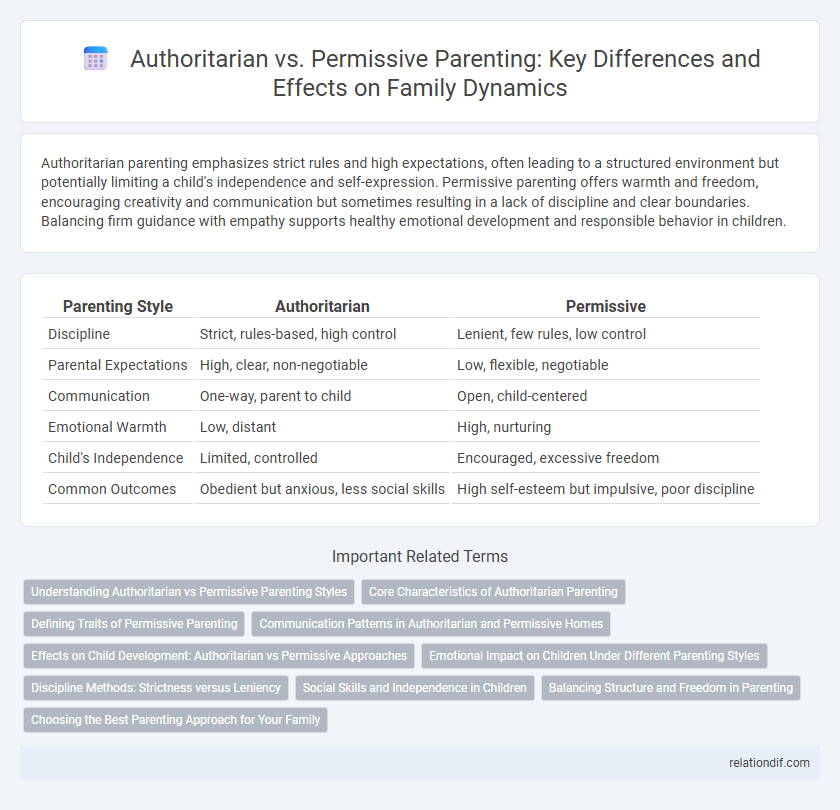Authoritarian parenting emphasizes strict rules and high expectations, often leading to a structured environment but potentially limiting a child's independence and self-expression. Permissive parenting offers warmth and freedom, encouraging creativity and communication but sometimes resulting in a lack of discipline and clear boundaries. Balancing firm guidance with empathy supports healthy emotional development and responsible behavior in children.
Table of Comparison
| Parenting Style | Authoritarian | Permissive |
|---|---|---|
| Discipline | Strict, rules-based, high control | Lenient, few rules, low control |
| Parental Expectations | High, clear, non-negotiable | Low, flexible, negotiable |
| Communication | One-way, parent to child | Open, child-centered |
| Emotional Warmth | Low, distant | High, nurturing |
| Child's Independence | Limited, controlled | Encouraged, excessive freedom |
| Common Outcomes | Obedient but anxious, less social skills | High self-esteem but impulsive, poor discipline |
Understanding Authoritarian vs Permissive Parenting Styles
Authoritarian parenting emphasizes strict rules, high expectations, and obedience, often resulting in a rigid family structure that limits child autonomy. Permissive parenting, characterized by warmth and leniency, allows children significant freedom but may lack consistent boundaries, potentially leading to behavioral issues. Understanding the balance between control and freedom is critical for fostering healthy child development and emotional well-being.
Core Characteristics of Authoritarian Parenting
Authoritarian parenting is characterized by high demands and strict rules, with parents enforcing obedience through punishment rather than dialogue. These parents expect unquestioned compliance and often display low warmth or responsiveness towards their children's emotional needs. This style can lead to children who are disciplined but may struggle with self-esteem and social skills.
Defining Traits of Permissive Parenting
Permissive parenting is characterized by high responsiveness and low demandingness, where parents exhibit warmth and support but set few boundaries or rules. Children raised with permissive parenting often experience limited discipline and increased freedom to make their own choices. This style contrasts with authoritarian parenting, which emphasizes strict rules and control over children's behavior.
Communication Patterns in Authoritarian and Permissive Homes
Communication patterns in authoritarian homes are often rigid and top-down, where parents enforce strict rules with limited open dialogue, leading to less emotional expression from children. In permissive homes, communication tends to be more open and warm but lacks clear boundaries, which can result in inconsistent guidance and challenges in decision-making for children. Effective family dynamics benefit from balanced communication that combines firm expectations with supportive interaction.
Effects on Child Development: Authoritarian vs Permissive Approaches
Authoritarian parenting often leads to children exhibiting lower self-esteem, higher levels of anxiety, and reduced social competence due to strict discipline and limited emotional expression. In contrast, permissive parenting tends to result in children who may struggle with self-regulation, authority, and academic performance due to a lack of consistent boundaries. Both styles affect emotional development and behavior, highlighting the importance of balanced parenting approaches for fostering healthy child growth.
Emotional Impact on Children Under Different Parenting Styles
Authoritarian parenting often leads to children experiencing higher levels of anxiety, low self-esteem, and difficulty in social interactions due to strict rules and limited emotional expression. In contrast, permissive parenting may result in children struggling with self-discipline and impulse control, but they tend to exhibit higher self-confidence and warmth in relationships. Emotional development under these styles significantly influences children's long-term mental health and coping abilities.
Discipline Methods: Strictness versus Leniency
Authoritarian parenting employs strict discipline methods, emphasizing rigid rules and immediate obedience to instill order and predictability, often resulting in high control but low warmth. In contrast, permissive parenting adopts leniency, favoring open communication and few behavioral restrictions, which may foster creativity but risks lack of boundaries and self-discipline. Research indicates that balanced discipline, combining consistency with nurturing, promotes better emotional regulation and social competence in children.
Social Skills and Independence in Children
Authoritarian parenting often results in children with less developed social skills due to strict rules and limited emotional expression, hindering peer interactions and conflict resolution. Permissive parenting tends to foster higher independence but may lead to challenges in social boundaries and self-discipline, impacting effective communication and cooperation with others. Balanced social development and autonomy are better supported through consistent, nurturing guidance that combines clear expectations with emotional support.
Balancing Structure and Freedom in Parenting
Authoritarian parenting emphasizes strict rules and high expectations, often limiting children's freedom to foster discipline and order. Permissive parenting prioritizes freedom and emotional support, sometimes sacrificing structure and consistency. Balancing structure and freedom involves setting clear boundaries while encouraging independence and open communication to promote healthy child development.
Choosing the Best Parenting Approach for Your Family
Authoritarian parenting emphasizes strict rules and high expectations, often leading to obedient but less socially skilled children. Permissive parenting offers warmth and freedom, which can foster creativity but sometimes results in lack of discipline and self-control. Balancing structure with empathy, by setting clear boundaries while nurturing emotional support, creates an optimal environment for healthy child development.
authoritarian parenting vs permissive parenting Infographic

 relationdif.com
relationdif.com